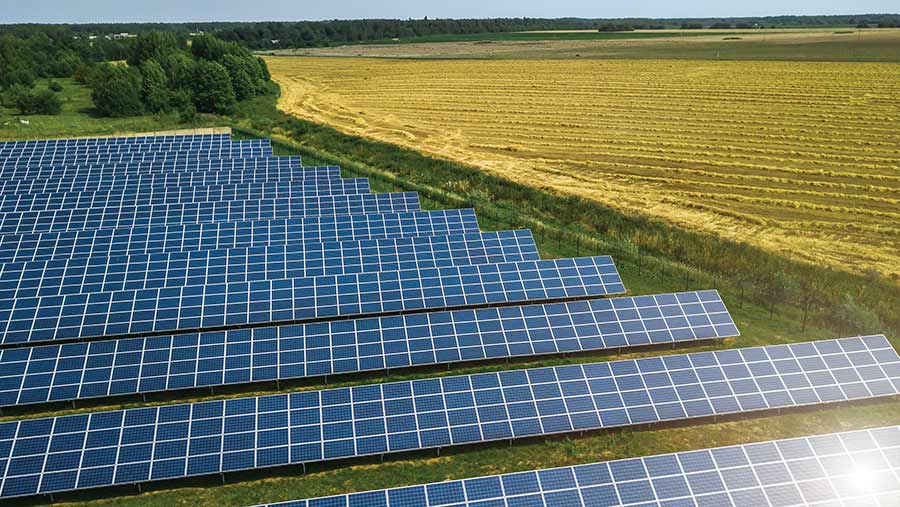High prices create opportunity for renewable energy contracts
 © Adobe Stock
© Adobe Stock Sharp rises in gas and electricity prices may have been unwelcome for most, but for those generating renewable energy, it has increased potential returns from electricity sales.
Prices are very volatile, but at the time of writing, a 12-month power purchase agreement (PPA) for exported electricity from a typical 100kW rooftop solar array was worth about 12p/kWh.
This is well above the 5.7p/kWh export tariff typically paid just a few months ago, according to NFU Energy’s head of service delivery, Ben Ablewhite.
“The real winners were larger-scale energy generators on flexible procurement contracts that immediately benefited from the upturn in prices.
“It more than makes up for times during the pandemic when pricing on these contracts was very low and occasionally went into negative value.”
Such contracts are relatively uncommon for typical farm-based renewable energy generation though, with most locked into fixed-price PPAs, usually for 12-24 months, limiting any immediate gains from higher prices.
See also: Power purchase agreement advice
Higher PPA prices
However, the value of new PPA contracts has followed the upturn in energy markets, so anyone looking to renew or extend an existing contract, or set up a new agreement, will find prices have moved higher.
Mr Ablewhite says caution is needed as PPA markets, like wider energy markets, are extremely volatile, with prices moving hourly.
When the markets were recently at their most volatile, prices were hard to come by. More recently, many suppliers are very stretched, so while offers are forthcoming, they are often slow to materialise.
What is a PPA?
Generally this refers to an agreement or contract between a generator of energy and a buyer of that energy
“Even so, if you’re in the market for a new PPA now or in the next 12 months, it is a good time to be shopping around.
“Some prices being offered are quite conservative, so it pays to compare several offers, ideally from three to five different companies.”
Examine the options
Charles Ward, a director with adviser New Stream Renewables, says that even if owners of renewable energy systems are still contracted to an electricity company, it is possible to look into extending an existing PPA contract or set up a new one to begin when the existing term expires to lock-in to higher prices.
Illustrating the uplift in prices, he cites the example of a new PPA for a 500kW farm turbine with a 1 January 2022 start date.
At the time of writing it was worth about £130-£150/MWh once power sales and “embedded benefits” were included.
This is more than double the £55/MWh price floor set by the Feed-in Tariffs export tariff 18 months ago.
“The main concerns in energy markets mostly relate to this winter and into next year. Longer-term deals beyond 2022 are still at a slight price premium, but nothing like the levels we’re currently seeing.
“My feeling is that we may be close to the top of the market, so to lock into higher prices for the next one, two or three years, it is worth fixing a PPA.”
Dig out any unused Regos
The value of Renewable Energy Guarantees of Origin (Rego) certificates on secondary markets has also increased considerably in the past year, so could provide useful income for anyone with unused certificates, Mr Ward says.
Ofgem issues generators of renewable electricity one Rego certificate for every megawatt hour (MWh) of eligible renewable output, with certificates usually sold to the electricity company alongside any power exported to the grid.
However, farmers using a large proportion of generated electricity on-site (for example, to power cold stores) may have unused Rego certificates, he explains.
The past year has seen their value increase from about 50p/MWh to nearer £2.50-£3/MWh (for solar and wind) and nearer £1.80-£2/MWh for anaerobic digestion.
“Many energy suppliers buy their power from wholesale markets and demonstrate their green credentials by buying Regos.
“This process [called ‘greenwashing’] has pushed up the value of Rego certificates as more corporate customers want to demonstrate they are doing their bit with renewable energy.”
Mr Ward recommends going through a third party to sell Rego certificates, as it can be time consuming and difficult for individuals to do themselves.
Intermediaries are also able to deal in larger volumes of certificates, making it more attractive to buyers, he says.
‘Spill contracts’ offer risky reward
While fixed PPAs provide the greatest income certainty, some operators may consider taking out a so-called “spill contract” to capitalise on peaks in energy markets.
The price paid for electricity on such contracts varies half-hourly, following wholesale markets.
“Cash-out prices are extremely volatile, ranging anywhere from -£500/MWh to £4,000/MWh,” says Mr Ward.
“They may be a lucrative short-term option that pays more than a fixed-price PPA at certain times when markets are strong, but it’s not a long-term solution.”
There may be scope for anaerobic digester operators with two generators to run one on a fixed PPA and have a second unit on a spill contract, which can be switched on at times when prices are high, he says.
